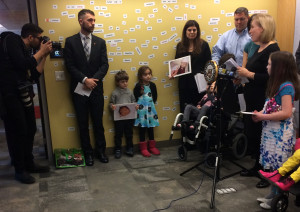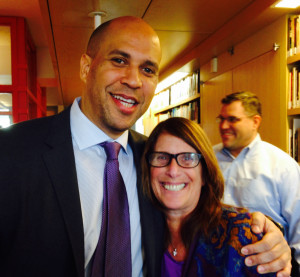EFMNY Joins Senators Gillibrand & Booker in Support of CARERS Act
“It was such a privilege to gather with New York & New Jersey families in NYC in support of the #CARERSAct legislation sponsored by Senator Kirsten Gillibrand, Senator Cory Booker, and Senator Rand Paul, which aims to reschedule cannabis to facilitate epilepsy research. The CARERS Act Bill will provide access to research, enabling families and their physicians to chose treatment options without fear of being in violation of federal law. It provides hope in the battle against seizures and we are deeply grateful to the bills sponsors.”
-Statement from Executive Director Pamela Conford of the Epilepsy Foundation of Metropolitan New York (EFMNY)

Senator Kirsten Gillibrand w/ NYC epilepsy advocate Paula Notari, mother of baby Emma Rose Mazurek, speaking to NY/ NJ families about the CARERS Act to Reschedule Cannabis
For full information on epilepsy and the CARERS Act, please read our blog post: http://epilepsynyc.com/2015/03/epilepsy-carers-act-reschedule-cannabis-marijuana-explained/

EFMNY Exc. Director Pamela and Senator Cory Booker in NYC supporting the #CARERSAct
Epilepsy and CARERS Act to Reschedule Cannabis Explained
What is the Compassionate Access and Research Expansion and Respect States (CARERS) Act to reschedule cannabis/ medical marijuana, and how does it relate to epilepsy?
The Compassionate Access and Research Expansion and Respect States (CARERS) Act
Medical Marijuana has been shown to alleviate symptoms of serious medical conditions including rare pediatric epileptic and seizure disorders, cancer, AIDS, and glaucoma.
Twenty-three states and the District of Columbia have passed medical marijuana laws legalizing the use of medical marijuana for qualifying patients under state law. However, the medical use of marijuana remains illegal under federal law. Even in states where medical marijuana laws exist, patients and providers are vulnerable to arrest and interference from federal law enforcement.
The bipartisan Compassionate Access and Research Expansion and Respect States (CARERS) Act would not penalize families from accessing prescribed medicine which ease the symptoms of these life threatening diseases by doing the following:
Ends the federal prohibition of medical marijuana under the federal Controlled Substances Act (CSA)
Marijuana is still illegal under any circumstances according to federal law. Physicians who prescribe marijuana for medical treatment in accordance with state law could still face federal prosecution for prescribing marijuana. The CARERS Act amends the CSA so that states can set their own medical marijuana policies. Individuals in states that take part in medical marijuana programs – patients, providers, businesses – will no longer be in violation of federal law.
Reschedules Marijuana from Schedule I to Schedule II
The Controlled Substances Act currently lists cannabis as a Schedule I drug. Schedule I drugs are those that have a high potential for abuse and has no currently accepted medical use in the United States. Cannabis’s classification as a Schedule I drug adds considerable complexity, expense, and potential access problems for clinical research. The CARERS Act moves marijuana from Schedule I to Schedule II. Under Schedule II the drug has a currently accepted medical use in treatment in the United States and may be prescribed by doctors on a limited basis.
Allow importation of Cannabidiol (CBD)
The CARERS Act would give children and adults with epilepsy and other seizure disorders access to the oil (called CBD) for treatment by removing CBD oil from the federal definition of marijuana in the Controlled Substances Act.
Banks to be allowed to do Business with Marijuana Dispensaries
Many banks do not provide financial services for state-authorized marijuana-related businesses because of fear of criminal penalties. This bill would provide legal immunity from federal criminal prosecution to banks and credit unions, their officers and employees that provide financial services to marijuana-related businesses that engage in activities pursuant to state law.
Research
The federal government retains strict controls over the use of marijuana for research purposes. Research expansion has been hindered by a complicated federal approval process and limited availability of research-grade marijuana. The CARERS Act removes unnecessary bureaucratic hurdles for researchers to gain government approval to carry out research on marijuana.
Access to Medical Marijuana for Veterans
VA doctors are currently prohibited from aiding patients seeking medical use of marijuana.The CARERS Act allows Department of Veterans Affairs doctors to recommend medical marijuana to military veterans suffering from serious injuries or chronic conditions like post-traumatic stress disorder, in states where it is legal.
=========================
For more information on how the Epilepsy Foundation of Metropolitan New York (EFMNY) is getting involved, please visit: http://efmny.org/events/
Take action! Urge your Senators to support the CARERS Act to facilitate research on cannabis and help the epilepsy community gain safe, legal access to this treatment option. For more information on this Epilepsy Foundation ACTION ALERT, and how you can get involved, please visit: http://capwiz.com/efa/issues/alert/?alertid=64207976
Epilepsy and Driving
Dear EpilepsyNYC Community,
Because of my epilepsy, I have never driven a car.
When I was around 17 years old, like many of my friends at that age, I was saving my allowance with the hopes of using the money to buy a car. I remember saying to my parents “When I drive, I’ll get in my car and go everywhere.” Driving represented freedom.
Around this time, the medication I had been on since I was diagnosed (age 11), wasn’t working like it once did. My doctor at the time, decided to put me on a new medication without taking me off the medication that was no longer working. As a result I got really dizzy at school and fell down the stairs; I was over medicated. I ended up missing school for a week, and needless to say, changed doctors after that.
It was my new doctor who broke the news: I wouldn’t be able to drive. I remember taking my car money out of the tin can it was in, feeling crushed. My dream of driving was gone. Even when I think back on it, after everything that has happened since then, I still get a little sad.
 I’ve met people with epilepsy who drive, but epilepsy is different for every person and every state has different rules about driving with epilepsy. Here in New York you have to be seizure free for a year and your doctor has to approve. Unfortunately, I have never spent a full year seizure free. And though there are bigger problems I have with epilepsy, I still wish I could drive.
I’ve met people with epilepsy who drive, but epilepsy is different for every person and every state has different rules about driving with epilepsy. Here in New York you have to be seizure free for a year and your doctor has to approve. Unfortunately, I have never spent a full year seizure free. And though there are bigger problems I have with epilepsy, I still wish I could drive.
Many of my friends tell me, “Don’t worry Kate, driving is overrated,” and I can understand their perspective, between the gas prices and traffic jams… But maybe they are simply trying to make me feel better. I can’t believe driving is overrated, and perhaps that is because I’ve never driven; I always have to be asking for a ride to go anywhere, when for almost everyone else, it seems as easy as just hopping into a car.
Like many of us do in New York, I complain about public transportation and taxi drivers, but I know that it could be worse. I am lucky to live in a city where I can get around easily. I can walk, take the bus, train or take a cab to get where I need to go. I hear about people living in places where it takes them 30 minutes just to get to the grocery store. I know it would be much more difficult for me if I lived somewhere where it was hard to commute. I am grateful, but some days are easier than other days. Some days I don’t feel comfortable taking public transportation or cabs.
Around 8 years ago, when I was on my way to school, I had a seizure on the bus. And 3 years ago, I had a seizure in a cab. I can only assume the cab driver didn’t know what to do or got scared, because he drove away and left me on the street, only a few blocks away from where I started.
It is frustrating when epilepsy controls your life, and ones ability to drive is certainly something epilepsy controls. It prevents you from freely doing what you need to do and going where you want to go.
I do hope one day I will be able to drive, but I also don’t want to put myself or anyone else on the road in danger. On the news, my parents and I heard that they are making cars that drive themselves. Maybe one day I can use one of those?
If one day I can drive that will be one less thing that my epilepsy controls.
My Life With Epilepsy
Dear EpilepsyNYC Community,
I am Kate Spratt. I am 28 years old, and I have epilepsy.
When I was six years old, I had my first seizure: on Christmas Eve, I was looking at the twinkling lights on our Christmas tree and my Grandma was talking to me but I wasn’t responding, I just kept looking at the lights.
However, I don’t remember this. All I remember is waking up in the hospital and being very confused. Worried that I was going to miss out on Christmas, I spent that night in the hospital having multiple tests and a spinal tap done. After that, for the next five years of my life, I was seizure free.
Then suddenly, when I was eleven, I had three grand-mal seizures and I was put on medication. During my pre-teen and teenage years, my seizures were under control (for the most part). I did have some “jerks,” but they didn’t affect me enough to debilitate me. I went to school, hung out with my friends, and participated in after school activities. I am grateful for that. I didn’t really talk about my epilepsy when I was a teenager, only a few of my close friends knew. Looking back, I think I didn’t tell people because I wasn’t sure how they would react.
Then, when I was around sixteen, I was in class one day, about to take a test, and I had a seizure. Next thing I knew, I was on my side, on the floor, and the ambulance was there. Luckily, my teacher at the time, used to work with children who had epilepsy and knew what to do when a student had a seizure. I had never had a seizure in school before. I was very tired (as I usually am after a seizure), but mostly very embarrassed. I swore I wouldn’t go back to school.
That night, the teacher called my house and spoke with my mom. She wanted to see how I was doing, and knowing I was probably embarrassed, also wanted me to know that everyone was very concerned about me. When my mom told me, I was relieved, but still kind of nervous of how people would react. Upon my return to school, no one said anything. When one girl shyly asked if I was feeling better I realized people were concerned. It was time to tell my friends, all my friends. Because seizures can happen, anywhere at any time, and people should know what to do.
Opening up about my epilepsy made my classmates comfortable enough to open up to me. I realized that a lot of people had family-members who had it too, while others, who were not familiar with epilepsy, wanted to know more. I knew then it wasn’t something to be embarrassed about; it was just a part of me. I think of it like this: some people have allergies, some people have asthma, and some people have epilepsy.
I proceeded to go to college and graduated with a Bachelor of Science in Secondary Education, with a 3.15 GPA and in four years. I did miss days sometimes because I had seizures and couldn’t go to school. I once even fell down the stairs on campus because I just kept walking and couldn’t stop. Graduating college was a huge accomplishment for me, because of how challenging it was at times. I couldn’t pull “all-nighters” like other students, and the workload could be quite stressful.
After graduating from college, I found a job that I loved at an after school program. On May 18, 2009, while I was taking a shower to get ready for work, I reached over, simply to adjust the water temperature slightly, and had a seizure, which caused me to accidentally turn the hot water on all the way and fall down. I don’t know how long I was under the scalding hot water and when I re-gained consciousness I didn’t even realize I was burnt; it was like I was in a fog. Twenty percent of my body was scalded and I had third degree burns. My whole back, my left arm and my thumb were burnt. I was in the hospital for five weeks. They said if I had passed out face forward I would have died. I had three skin grafts, I couldn’t walk, I couldn’t bend down, and I didn’t have range of motion in my arm for months. I had to wear compression garments for a year and do months and months of physical therapy in the hospital and everyday at home with my dad.
Ever since 2009 my epilepsy has gotten worse; the doctors don’t know why this is or why I even have epilepsy. No one in my family has ever had it, I never ran fevers as a child, or had any head injuries. I’ve been hospitalized numerous times and endured all sorts of different side effects brought on by my medications. I’ve been on so many different medications it feels like I’ve been on every AED out there.
I have my ups and downs with my epilepsy. I try to stay strong or say that I’m a medical mystery, since no one knows why or how my epilepsy has gotten worse. It’s always great when you take a few steps forward but such a defeat when you then take those steps back. Because of everything that has happened, especially in the past few years, people don’t understand how I’m an optimist. When it comes down to it, it would probably be easier to be a pessimist, but it’s important to appreciate the good things in your life, like your family and friends, the moments when you’re not having seizures, and most of all, the fact that I’ll never give up hope for that one day when I’ll stop being a medical mystery.
